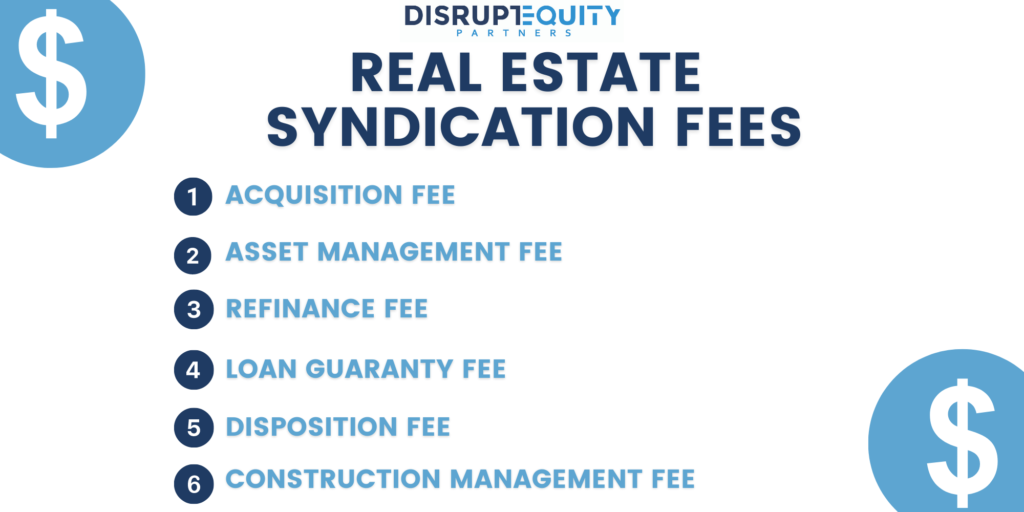How does a Real Estate Syndication work?
Real estate syndication is defined as combining the resources of several different real estate investors to complete a large commercial transaction. The federal Securities and Exchange Commission (SEC) supervises the syndication of real estate because it will involve the sale of “securities” in the form of an “investment contract.
Real estate syndications are an incredibly powerful way for syndicators to leverage the knowledge and resources of others. At the same time, it also provides an opportunity for investors to get involved entirely passively and hassle-free!
If you are interested in learning more about multifamily real estate syndications, please check out our complete guide here: Multifamily Syndications.
Today’s article will be walking through the fees associated with real estate syndications and how real estate syndication companies get paid! Whether you are interested in passive real estate investing or looking to syndicate your real estate deals, read along to examine the fees associated with syndications.
Real Estate Syndication Fees
Before investing in a real estate syndication, it’s crucial to examine the “norm” in the industry to ensure you are investing with a reputable real estate syndication company. As a passive investor, it’s essential to thoroughly analyze the multifamily offering documents and consult with a legal professional before jumping into a deal. The sponsorship group that has distributed the offering should always clearly disclose the fees associated with the real estate syndication.
Let’s take a look at the most common fees that occur in real estate syndications:
- Acquisition Fee
- Asset Management Fee
- Refinance Fee
- Loan Guaranty Fee
- Disposition Fee
- Construction Management Fee

Acquisition Fee
An acquisition fee in real estate serves as compensation for finding the deal and structuring the real estate syndication!
Most real estate syndication companies will charge an acquisition fee. The acquisition fee will vary from 1% to 5% of the property’s purchase price, and the percentage will depend upon the size of the deal. The larger the deal size, the higher the acquisition fee. For example, if the acquisition fee was 3% on a 10 million dollar apartment building- the real estate syndication company will receive $300,000 at closing.
The acquisition fee is a one-time payment paid to the real estate syndication company at the time of closing.
Asset Management Fee
The asset management fee is a continuous charge paid to the real estate syndication company. The asset management fee serves to reimburse the real estate syndication company for operating and managing the property during the investment.
In most cases, syndicators will charge a 1 to 3% percent asset management fee based on the gross revenue collected from the property and would be paid out either monthly or annually. In some cases, the asset management fee could be charged per apartment unit. The most common per unit asset management cost would be $200-$300 per unit annually.
Refinance Fee
Although a refinance does not always occur, a refinancing fee could be paid to the real estate syndication company as compensation for the work required to refinance the property. In most cases, this would be .5 percent of the new loan amount obtained.
Loan Guaranty Fee
A syndicator may use a person with a high net-worth/balance sheet to sign on the loan to receive the most lucrative financing terms for the property. If this is the case, this could result in a guaranty fee.
A guaranty fee is often paid once at closing to the loan guarantor for his or her role in signing on the loan. Alternatively, the syndication company could sign the loan themselves.
A guaranty fee is typically 2-3% of the loan amount but could vary depending upon the size of the loan.
Construction Management Fee
The real estate syndication company does not typically charge construction management fees; instead, these fees will be billed from a third-party construction management firm that is in charge of the property’s capital improvement process. The construction management fee can vary between 5-10% of the CAPEX budget and will depend on the deal’s size.
Although not common, if the real estate syndication company has an active role in the renovation process, they may charge a building and construction management fee.
Other Ways Real Estate Syndicators Get Paid
Equity Stake
Along with fees, another way syndicators get paid is through their equity stake in the project. Real estate syndicators will get compensated in the form of equity participation in the syndication. This essentially is the ownership share or equity stake in the real estate syndication!
The equity payout for real estate syndicators and investors will primarily depend on how the real estate syndication is structured.
To give you a typical example, if the syndication is structured as a 70/30 straight profit split. This would mean that 70% of the property’s profit would go to the passive investors in the project and 30% to the real estate syndication company.
For more information on real estate syndication structures, check out our complete guide here. Real Estate Syndication Structures- A Simple Guide
If you are interested in investing in multifamily real estate syndications with Disrupt Equity, please fill out our investment form to be notified of our upcoming apartment investment opportunities.

